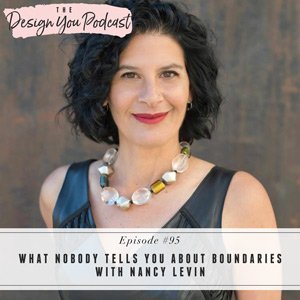
Boundaries are something that we usually have with others, but the boundaries that are most important are actually the ones we have with ourselves. If you find that you have been a people-pleaser, a workaholic, or have had time management issues, it is likely something to do with the boundaries you have for yourself.
And luckily, I have the absolute perfect superstar on the podcast this week to discuss where you might be going wrong. My guest today is Nancy Levin, a life coach extraordinaire who specializes in boundaries. She has some brilliant insights about boundaries that are so often overlooked and I learned so much from this interview myself.
I’m incredibly excited to be a part of this conversation and I can’t wait for you to dig into what Nancy has to share with you today. When you’re deciding on your targets for 2020, this podcast is going to be an incredible tool for you to actually design the year that you want to have. After listening to this, there will be no excuses for not going after your goals.
If you want to keep this conversation going, you have to join my free Design You Podcast community on Facebook. We have great conversations over there about the podcast episodes and our podcast guests are in there too! So head on over and I’ll see you there!












